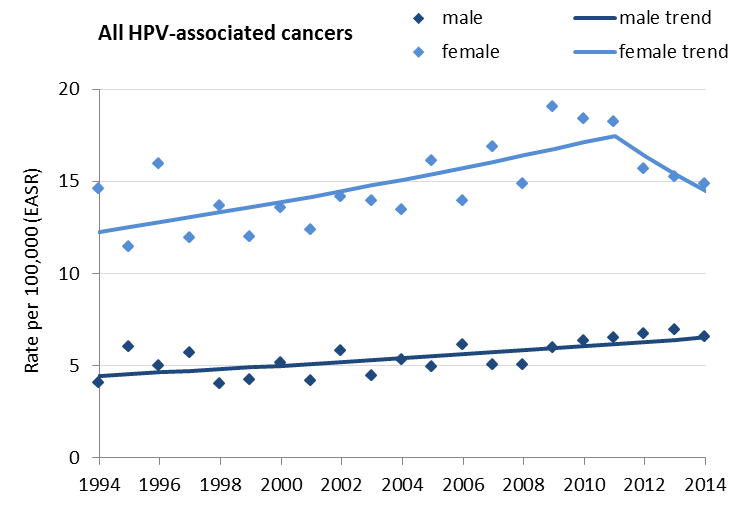Current Size: 100%
HPV-associated cancers in Ireland: report from the National Cancer Registry
The latest short report from the National Cancer Registry, published today, estimates that human papillomavirus (HPV) infection causes up to 420 cancer cases (or up to 130 cancer deaths) per year, most of which are potentially preventable by HPV vaccination (see infographic).

Chronic infection with oncogenic (tumour-causing) strains of HPV is now well-established as an important risk factor for anogenital (cervical, vaginal, vulvar, penile and anorectal) and head and neck (specifically oropharyngeal) cancers. The cancer risk relates mainly to carcinomas of the cervix and to squamous cell carcinomas (SCCs) of the other sites. HPV infection is mainly spread through skin-to-skin contact during sexual activity, and around 80% (4 in 5) of people will be infected at some point in their lives. It is important to note that some of these cancers, collectively grouped as HPV-associated cancers, may arise from other causes. However, by taking account of available data on the proportions of cases with HPV involvement, numbers of HPV-attributable cancers (those likely to be caused by HPV infection) can be estimated.
- On average, 538 cases of HPV-associated cancers were diagnosed per year in Ireland during 2010-2014, of which 393 (3 in 4) were in women, 145 (1 in 4) in men. Cervical carcinomas were the most frequent (on average 292 cases per year). Next most frequent were SCCs of oropharyngeal sites (133 per year), vulva (38), anus and rectum (36), penis (32) and vagina (10). In total, these cancers accounted for about 2.6% (1 in 38) of all invasive cancers (excluding non-melanoma skin cancer) diagnosed in Ireland during 2010-2014, or 4.1% (1 in 24) for females, 1.3% (1 in 77) for males.
- Overall age-standardised rates of these cancers were two to three times higher in Irish women than in Irish men. Rates of anal/rectal SCC were also higher in women than in men, but rates of oropharyngeal SCC were three to four times higher in men than in women.
- Irish incidence rates were substantially lower than US rates for oropharyngeal, anal and rectal SCCs, but substantially higher than US rates for cervical carcinoma and penile SCC. Total rates of HPV-associated cancer were c20% (one-fifth) higher in Irish women but c35% (one-third) lower in Irish men than in the US. These differences presumably reflect lower risk for some of these cancers in Ireland, possibly involving differences in sexual behaviour or distribution of HPV types, but higher risk for cervical and penile cancer here (for reasons that are not clearly established).
- In Ireland, current preventive approaches to these cancers mainly involve organised programmes of screening for cervical pre-cancers in women aged 25-60 years (2008 onwards) and HPV vaccination in girls from first year in second-level schools (2010 onwards). The international evidence and policy considerations in relation to HPV vaccination for adolescent males are under review.
- Detailed figures specific to Ireland are not yet available on the proportions of these cancers directly attributable to HPV infection although research is ongoing. However, recent estimates from the US suggest that 1 in 9 or 91% (at least) of cervical carcinomas, 91% of anal/rectal SCCs, and 63%-75% (6-7 in 10) of oropharyngeal, vaginal, vulvar and penile SCCs are caused by HPV; for oropharyngeal SCC, recent UK estimates suggest a lower figure (52%, 1 in 2). Most risk is attributable to HPV types 16 and 18, included in the HPV vaccine currently available to Irish girls. Use of these US figures, or UK figures for oropharyngeal SCC, would suggest up to about 420 cancer cases annually in Ireland are attributable to HPV (335 in women, 85 in men), or up to 320 (250 in women and 70 in men) to HPV types covered by the ‘4-valent’ vaccine currently used in Ireland. Up to 380 cases (300 in women and 80 in men) could be attributable to HPV types included in the ‘9-valent’ vaccine which has recently replaced the 4-valent vaccine in the US.
- There were, on average, about 180 deaths per year from HPV-associated cancers in Ireland during 2010-2014, with approximately twice as many in women as in men. Of these, up to 130 cancer deaths per year (c100 in women and c30 in men) are estimated to be attributable to HPV; up to 100 (c75 in women and c25 in men) to HPV types included in the current Irish vaccine; or up to 120 (c90 in women and c30 in men) to HPV types included in the 9-valent vaccine now used in the US.
- Although the figures here are preliminary estimates or approximations, they suggest that effective use of the current 4-valent HPV vaccine could, over time, prevent up to two-thirds of all HPV-associated cancers in Irish women; and up to half of those cancers in men, or three-fifths of cases across both sexes, if vaccination were extended to boys. Broadly similar potential benefits could be expected in terms of prevention of deaths from these cancers. Additional benefits (perhaps prevention of up to 7 out of 10 HPV-associated cancers) could be expected if additional HPV types were included in the vaccine used.
- Overall incidence rates of HPV-associated cancers increased by about 2% per year over most of the period 1994-2014. In comparison, cancer rates as a whole in Ireland increased more slowly over the same period. Rates of oropharyngeal and anal/rectal SCC have increased significantly; trends were non-significant for vaginal, vulvar and penile SCC, while trends for cervical carcinoma were more complex (but with an increase between 1999 and 2010).
- Five-year relative survival currently averages from as low as 53% for oropharyngeal SCC up to about 75% for cervical carcinoma and anal/rectal SCC, or about 65% for these cancers combined (figures not standardised for age). Only oropharyngeal and anal/rectal SCC have shown clear evidence of survival improvements since the mid 1990s, despite increases seen in the use of radiotherapy and, especially, chemotherapy for many of these cancers.
Commenting on the report’s findings, Professor Kerri Clough-Gorr, Director of the National Cancer Registry noted: “Cancers associated with HPV infection are potentially highly preventable. Much progress has been made in vaccinating girls against HPV, with the aim of reducing infection and, ultimately, the number of pre-cancerous lesions that may progress to cervical cancer. There is also good reason to believe HPV vaccination should be effective in preventing other specific cancers, and the potential benefits of extending HPV vaccination to boys are currently being considered. However, a recent severe downturn in the uptake rate of HPV vaccination among Irish girls, reflecting unconfirmed vaccine safety concerns, is very concerning. This needs to be addressed urgently to help reduce the impact of these often-fatal cancers.”
The full report can be downloaded here.
News Archive
- March 2024 (1)
- February 2024 (1)
- January 2024 (4)
- December 2023 (1)
- November 2023 (1)
- August 2023 (1)
- June 2023 (3)
- May 2023 (1)
- January 2023 (2)
- November 2022 (2)
- October 2022 (1)
- September 2022 (2)
- August 2022 (3)
- June 2022 (2)
- May 2022 (3)
- April 2022 (2)
- March 2022 (2)
- February 2022 (3)
- December 2021 (1)
- August 2021 (1)
- 1 of 7
- ›
Building 6800
Cork Airport Business Park
Kinsale Road, Cork T12 CDF7
Email Contact us here
Tel: +353 (0) 21 4318014
Fax: +353 (0) 21 4318016





